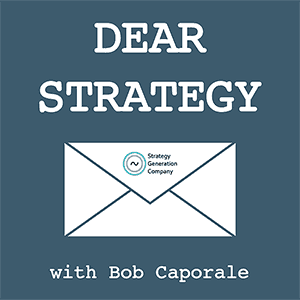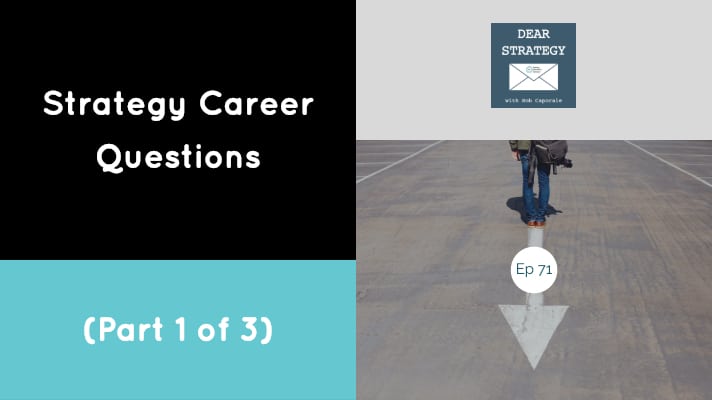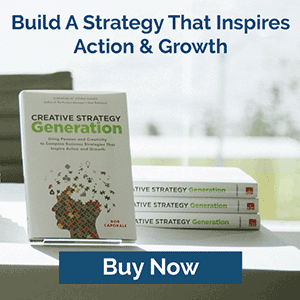Dear Strategy:
“How do I evaluate job opportunities between large but worse performing products vs. small but not yet proven products?”
As you can see from the title of this post, I have selected this question to be the first in a 3-part series of career-related questions. It’s getting toward the end of the year, so I thought I would end 2018 and begin 2019 with some advice on making job changes, if anyone is so inclined to do so. Because, hey, strategy isn’t only about business, it’s also about life! So, let’s get to it…
Evaluating job opportunities can certainly cause a lot of stress – mostly because very few of those opportunities ever fit our ideal scenario of exactly what we want to happen next in our careers. Said differently, it’s a rare occasion when what we have in mind for ourselves and what our companies have in mind for us are a perfect match. And that leaves us with life choices that are not always easy to make.
When you find yourself faced with such choices, especially early on in your career, I always recommend that you evaluate not only the opportunity itself, but also the path you believe that opportunity is ultimately putting you on. Yes, you need to be passionate about what you do – but having full-out passion for every step in every process is an almost impossible task. So, sometimes you need to step back, look at the bigger picture, and ask yourself not only if you love what you’re doing today, but also if you love the place where whatever you’re doing can eventually take you. It’s the combination of those two things that will usually steer you in the right direction.
Many of you who follow some of my other endeavors may know that, when I’m not writing or teaching about strategy, I’m composing music and soundtracks. And although I am passionate about my music, I am definitely not passionate about every part of the music-making process. Writing is fun, but scoring is tedious. Recording is exciting but mixing is not my favorite thing to do. The point is, I don’t care for every step, but I know that all of those steps will ultimately lead to a final result that I absolutely love. And that’s why I do what I do.
So how does that relate to one’s career? Well, the truth is, your career is really just a series of steps toward some final result. And when you view it that way, you’ll find that career choices become a whole lot easier to make.
“…your career is really just a series of steps toward some final result.“
In this particular case, if your goal is to be a General Manager, then getting a full range of product management experience will only help you in the long run. Every good leader needs to know how to manage both naturally successful businesses as well as extremely challenged businesses, and there is no better way to get that experience then by managing product lines that fall into those exact same categories. So, if you already have one of those experiences, then definitely give the other one a try. But only if your ultimate goal is to become a more well-rounded leader.
Some people, on the other hand, are more inclined to manage a product or business that they just truly love – no matter what. I can tell you that if I had landed a job as a product manager for a music technology company, I probably would have been happy with that for pretty much the rest of my career. And I probably would have taken just about any job that I needed to in order to work my way into that role. So, again, the path is what you need to try to figure out – sometimes even over the individual job that you may be considering.
Now, given the 2 choices that were presented in this particular question, my assumption is that this person’s decision is being at least partially based upon the likelihood of long-term success for each product line. A large but worse performing product line screams “safe” to me – meaning that it is probably a product on the other side of maturity with lower expectations for continued growth. A small but not yet proven product line says “risky” to me – meaning that it could be a huge success or a huge failure, and either of those scenarios is likely to have a pretty big impact on this person’s career.
Which brings me to another point when deciding on the path that you ultimately want to be on…
Companies tend to embrace a reward system that is based on short-term results over long-range planning. And that sometimes leads to career decisions that are more heavily weighted on optics over passion. Of course, I would never tell you that financial performance of a business isn’t important, nor would I tell you to ignore any inclination you might have to make more money and move up in your career. What I would tell you, though, is that, regardless of how it may appear on the surface, companies will ultimately reward you for what you’re good at. And what you’re good at is more than likely to also coincide with what you’re passionate about. So, try not to worry about predicting which path will give you more money. Because, if you’re doing what you’re supposed to be doing, the money is likely to find you one way or another. And if you really love what you do, then it may not matter anyway.
Instead, I recommend going back to what we spoke about earlier – passion and path. And, more importantly, a path that you’re passionate about. If you choose your opportunities based on that criteria, no opportunity will ever be wasted. And, collectively, all opportunities will lead you to a place where you truly want to be.
Listen to the podcast episode
Dear Strategy: Episode 071

###
Are you interested in strategy workshops for your product, marketing, or business managers? If so, please be sure to visit Strategy Generation Company by clicking the link below:
 Bob Caporale is the founder of Strategy Generation Company, the author of Creative Strategy Generation and the host of the Dear Strategy podcast. You can learn more about his work by visiting bobcaporale.com.
Bob Caporale is the founder of Strategy Generation Company, the author of Creative Strategy Generation and the host of the Dear Strategy podcast. You can learn more about his work by visiting bobcaporale.com.







